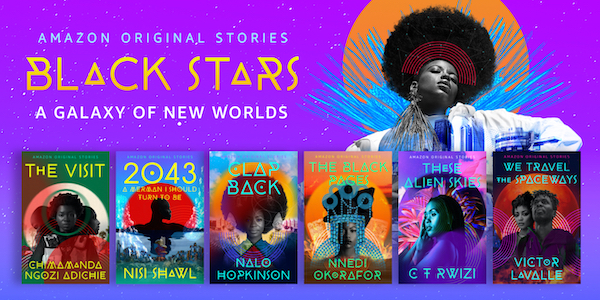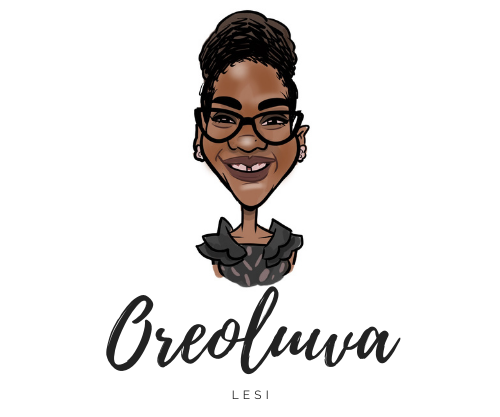
Black Stars: A Galaxy of New Worlds
While I consider myself to be a wide reader, there are some genres that I have read very little of as an adult.
Science fiction is definitely one of them. As a teenager, I read a lot of Doctor Who. Does that count as sci-fi? Well, I think so because science and technology featured very heavily in the books. When I was reading them, I probably thought of them more as adventure books, because the plot moved fast with a race against time and a fight against a worthy adversary.
A few months ago, I picked up a copy of Kindred by Octavia Butler that I’ve had for about 18 years without reading (when I tell you that I have a formidable To-Be-Read pile, I’m not joking).
Aside from the time travel, it was not science fiction in the traditional sense. I know that Octavia Butler is categorised as a science fiction writer and I plan on reading The Parable of the Talents next, which I’ve learnt fits more within the conventional idea of sci-fi.
One things I really liked about Kindred was how the author interrogated black women’s place in a Western society without being overly academic. And the time travel from pre-civil war slave-time US to the 1970s California allowed us to see how different life was for black women without being didactic.
Next, I moved on to Black Stars: A Galaxy of New Worlds, a 6-story sci-fi, speculative collection by black writers. It’s described as “a multi-dimensional collection of speculative fiction from Black authors. Each story is a world much like our own.”
This caught my attention, mainly because Chimamanda Ngozi Adichie wrote one of the stories “The Visit” about a world where women rule and men are the second sex. Knowing that she has never published science fiction, I figured her story would be accessible and create a world of what could be by situating it in a place that we recognise.
As I am neither a sci-fi expert nor particularly fond of short stories, perhaps I’m not best placed to give a critique of these stories. However, I was very interested in the premise of The Visit and noted with some dismay how the women in the story displayed the same condescension and disregard that men in power display towards women and people with less power. Somehow, I would like to think that women leaders would be very different from male leaders, but perhaps that is the point of the story. Power is power no matter who holds it?
I was drawn into the world of The Black Pages by Nnedi Okorafor from the first page, although the story builds-up slowly. Would those books be saved? Would he get out of the country alive? By the time, the story ended, I was left with more questions than I started the book with. Is that a good thing? I’m not so sure… I’d like to think that had it been a longer story, it would have been more satisfying.
The third story was 2043…A Merman I Should Turn to Be by Nisi Shawl. I really found the idea posed by this story this fascinating: African-Americans finally getting their 40 acres and a mule in 2043 US. Bad news though. Racism is still alive and well and follows them to the new world they are trying to build underwater, wielding its ugly influence on the decisions they make ’till the end. The story appeared to jump in parts and I almost lost the plot. I figured it out in the end, but this story could have been more smoothly told.
Then there was Clap Back by Nalo Hopkinson. For the first few pages, I was like “What is this?”, “What’s going on?”, “Why is this lady so angry?”. This was an examination of race relations in all its ugly detail. It was unfortunate to move from the lead character to her granddaughter some decades later and see that the colour of one’s skin still determined the quality of one’s life and the level of agency they had. Both women were determined to be the architect of their fate come what may and planned the ultimate clap back to an unjust system.
These Alien Stars by C.T. Rwizi was the most accessible story in this collection and perhaps closest to what I imagine most people’s ideas of sci-fi is. It was at heart a simple love story, though I didn’t realise it at first. If there were theme songs for this story it would be “Love will make a way” and “We are the world.” We see a people who are divided and mostly hostile towards the stranger in their midst coming around to thank him for the chance to open themselves to the world out there.
A deceptively simple story that packs a punch and easily my favourite and the one I would re-read first.
To cap off the collection was We Travel the Spaceways by Victor LaValle. I’ll be honest: this was my least favourite. The lead was an unlikable character doing despicable things and his reasons made no sense to me. Ambiguous endings, like this one had, often have me wondering what really happened. With this, I didn’t care too much beyond the fact that the story had ended.
Science fiction demands that we suspend all disbelief about what is and should be. We enter into a new world where life may be either extremely utopian or dystopian and therefore I think the genre is an incredible way for us to examine the problems in our society and analyse the existing power dynamics.
I can imagine that it’s not for everyone, with many people preferring stories set in the “real world.” Every time I pick up a book, I’m looking to get lost in another world anyway, so I think I’m going to be reading more sci-fi and possibly fantasy from now on.

Recent Comments